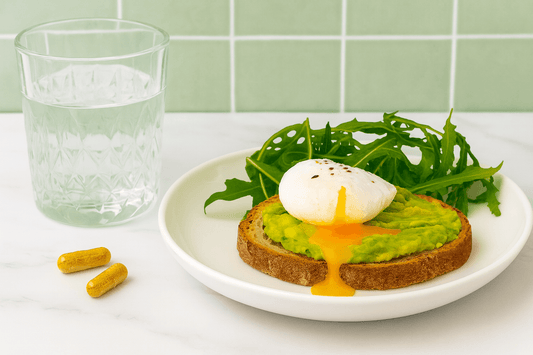
Managing anxiety: How to support your nervous system in the modern world
It's 9pm. You've finally closed your laptop after a day of meetings, commuting, and juggling work and home priorities in your mind. It’s time to wind down for the evening, but your nervous system hasn't caught up. Your mind is still busy with tomorrow's to-do list, and your body feels tense.
If this sounds familiar, you're far from alone. According to NHS data, approximately 8.2 million people in the UK live with anxiety disorders, and when you factor in the unique pressures of modern city living, it's no wonder so many of us struggle to find our off switch.
The costs of modern life and city living on mental health
Modern life presents a perfect storm of stressors that can overwhelm our nervous systems. The constant noise pollution, air quality concerns, cramped living spaces, long commutes, and the relentless pace of working life all contribute to our rising stress levels.
Our bodies and minds evolved to handle acute, short-term stressors, not the chronic, low-level stress that characterises modern urban living. When we're constantly in a state of heightened alertness, our nervous system struggles to shift into the rest-and-digest mode that's essential for recovery and wellbeing.
Common signs your nervous system is overwhelmed
- Difficulty winding down in the evening despite feeling exhausted
- Racing thoughts that make it hard to fall asleep
- Energy crashes in the afternoon
- Feeling "wired but tired"
- Digestive issues or changes in appetite
- Increased sensitivity to noise, light, or crowds
- Muscle tension, particularly in the neck and shoulders
- Difficulty concentrating or making decisions
Stress and nutrient depletion
When under chronic stress, our bodies burn through certain nutrients at an accelerated rate. It’s a vicious cycle: stress depletes essential nutrients, and nutrient deficiencies make us less resilient to stress.
Magnesium: Nature's relaxation mineral
Magnesium is an essential mineral that plays a crucial role in over 300 enzymatic reactions in the body, including those that regulate our stress response. When we're stressed, our bodies rapidly deplete magnesium stores, leading to:
- Increased muscle tension and cramps
- Difficulty falling asleep or staying asleep
- Heightened anxiety and irritability
- Fatigue and low energy
Research shows that magnesium supplementation can significantly reduce anxiety symptoms and improve sleep quality. A study published in the Journal of Research in Medical Sciences found that magnesium supplementation improved subjective measures of insomnia, including sleep efficiency and sleep time.
B Vitamins: The stress-fighting team
B vitamins work synergistically to support nervous system function and help our bodies cope with stress. When we're under pressure, our demand for B vitamins increases dramatically:
- B1 (Thiamine): Essential for nerve signal transmission and energy metabolism
- B6 (Pyridoxine): Helps produce neurotransmitters like serotonin and GABA
- B12 (Cobalamin): Supports nerve health and cognitive function
A deficiency in B vitamins can contribute to feelings of anxiety, depression, and fatigue.
Practical strategies for managing anxiety
While we can't completely eliminate stress from our lives, we can take proactive steps to support our nervous system and build resilience.
1. Stabilise your blood sugar
Blood sugar fluctuations can mimic and exacerbate anxiety symptoms. When blood sugar drops, our bodies release stress hormones like cortisol and adrenaline, triggering feelings of anxiety, shakiness, and panic.
Key strategies:
- Eat regular, balanced meals that include protein, healthy fats, and complex carbohydrates
- Avoid skipping meals, especially breakfast
- Choose nutrient-dense snacks like nuts, seeds, or Greek yogurt with berries
- Limit refined sugars and processed foods that cause blood sugar spikes and crashes
2. Mind your caffeine intake
While that afternoon coffee might seem necessary for getting through the day, caffeine can significantly impact anxiety levels and sleep quality. Caffeine has a half-life of 6-8 hours, meaning that coffee consumed at 2pm is still affecting your system at bedtime.
Consider:
- Switching to decaf after midday
- Gradually reducing overall caffeine intake
- Opting for green tea, which while having some caffeine also contains L-theanine, an amino acid that promotes relaxation
3. Create evening rituals for nervous system regulation
Developing consistent evening routines signals to your nervous system that it's time to transition from the sympathetic (fight-or-flight) to parasympathetic (rest-and-digest) state.
Effective evening practices:
- Dimming lights and using ‘eye comfort’ mode on devices
- Taking a warm bath with Epsom salts (magnesium sulfate) or using lavender toiletries
- Practicing gentle stretching or restorative yoga
- Deep breathing exercises or meditation
- Reading a book instead of scrolling through your phone
4. Strategic supplementation for nervous system support
Given the increased nutrient demands of modern life, targeted supplementation can provide valuable support for managing anxiety and stress.
City Survivor Vital Minerals Magnesium provides highly bioavailable magnesium in optimal doses to support muscle relaxation, improve sleep quality, and help regulate the stress response. Unlike some forms of magnesium that can cause digestive upset, this formula is designed for maximum absorption and tolerance. Never take mega doses of Magnesium as it upsets the gut.
For comprehensive nervous system support, City Survivor Pollution Protection Multivitamin + Antioxidant Complex delivers a full spectrum of B vitamins alongside other essential nutrients. This formula is specifically designed to combat the unique stressors of urban living, including environmental toxins and pollutants that can contribute to oxidative stress and inflammation.
Quality sleep is fundamental to anxiety management, and City Survivor Night Support combines gentle, natural ingredients to help your nervous system transition into restorative sleep mode without the grogginess often associated with sleep aids.
Environmental factors: Protecting yourself from urban stressors
City living exposes us to environmental stressors that can contribute to anxiety and overwhelm our detoxification systems.
Air quality and mental health
Research increasingly shows links between air pollution and mental health issues. Fine particulate matter and other pollutants can trigger inflammatory responses that affect brain function and mood regulation.
Protection strategies:
- Use air purifiers in your home and office
- Take advantage of parks and green spaces when possible
- Consider indoor plants that help filter air
- Support your body with antioxidant-rich foods and supplements
When to seek professional support
While lifestyle changes and nutritional support can be incredibly helpful, it's important to recognise when professional help is needed. Consider consulting with a healthcare provider if you experience:
- Persistent anxiety that interferes with daily activities
- Panic attacks or overwhelming fear
- Significant changes in sleep, appetite, or energy levels
- Thoughts of self-harm or feelings of hopelessness
- Physical symptoms like chest pain, shortness of breath, or heart palpitations
Building long-term resilience
To manage anxiety in the modern world, we need to build resilience and develop tools to navigate life's inevitable stressors with greater ease.
Start with small, sustainable changes rather than attempting a complete lifestyle overhaul. Focus on one or two strategies that resonate with you, whether that's establishing a consistent sleep routine, incorporating stress-supporting nutrients, or practicing daily mindfulness.
Supporting your nervous system is a daily process. By taking proactive steps to nourish your body and mind, you're investing in your long-term wellbeing and your ability to thrive in a fast-paced world.
The goal isn't to eliminate stress entirely – that's impossible! Instead, it's about supporting your body's natural ability to handle stress, recover more quickly, and maintain balance even when life’s hectic.



